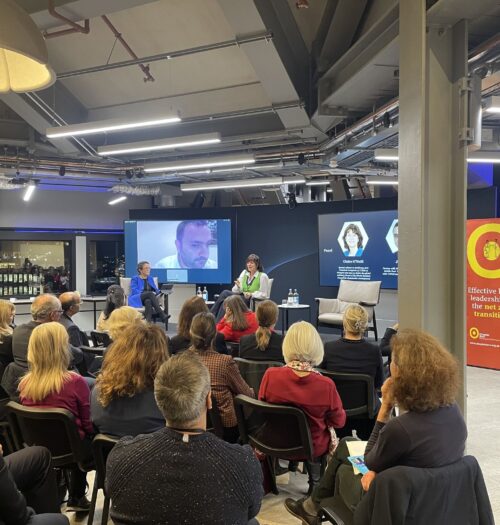
Drawing impetus from the global context
Setting the scene for COP28
Joe Rahi, Partner, McKinsey & Company in the Middle East, and leading McKinsey’s sustainability in the Middle East joined the panel from Dubai to provide insight into this year’s COP taking place between 30th November to 12th December in Expo City, Dubai, United Arab Emirates.
Joe set the scene for COP28 highlighting 2023 as the year of the first Global Stocktake, a milestone where the world measures its progress against the goals of the Paris Agreement. He presented findings which showed the world is off track in mitigation, adaptation, climate financing and the energy transition. However, there is reason for optimism: it is not too late to meet the goals set out in the Paris Agreement if business and government act now, highlighting amongst other things that the technology needed to reduce 70-90 % of emissions has been invented, it is only a matter of making it commercially viable.
Joe highlighted the key changes to this year’s COP compared to previous COPs as set out in the COP28 Presidency’s ambitious strategy centred around four pillars:
- Fast-tracking the energy transition and reducing emissions before 2030.
- Transforming climate finance: The physical format of COP28 has been designed to enable more private sector collaboration.
- Adaptation – putting nature, people, lives and livelihoods at the heart of climate action will be a major focus this year, including the first health day at a COP.
- Achieving the most inclusive COP.
The energy transition and climate financing
Susan Hooper, board member, Chapter Zero, Clare O’Neill, Special Advisor to McKinsey and the first President-Designate of COP26 in Glasgow, and Jayanti Kar, Partner in McKinsey’s energy practice joined the panel. Claire shared some of her own experiences from her time working in government towards COP26, her outlook of COP28, as well as her thoughts on how COP in general progresses climate action.
Claire explained the importance of COP in providing a global moment for all to come together and recognise the climate challenge that we face. Although more progress is still needed to meet the goals laid out in the Paris Agreement, it was identified that over the almost 30 years of COP there has been a significant increase in renewable energy supply, private and public sector coalitions to progress climate action, and increased awareness globally of the impacts of climate change.
The panellists responded to questions raised by the audience, and the following moderated discussion centred around the following key points:
- Global Energy Perspective: The panellists recognised the importance of the sector in achieving and accelerating the energy transition, and the need for coalitions between the private and public sector to support this. Joe and Jayanti emphasised the importance of not solely focusing on building the energy system of the future but decarbonising the energy system we have today, with the oil & gas sector playing a role in this.
- Balancing the financial carbon equation: An experience Claire recollected from one of her own boards, was asking her fellow directors whether they should disclose emissions per share to recognise carbon as an equivalent to cash. All the panellists agreed that a strong first step for NEDs is to oversee the implementation of an internal carbon pricing to create the appropriate culture within the organisation to recognise carbon as important as the bottom line.
- Shift from compliance to opportunity: With the increased focus on the private sector in the energy transition and improved space for start-ups, there is a huge opportunity for organisations to invest and integrate climate into their strategy rather than be solely a compliance task. The energy transition will be the biggest shift in capital to date, and businesses can support the goals of the Paris Agreement and benefit from this should they understand and take advantage of the opportunities available to them.
A question was raised around the just transition and how to ensure everyone is included in the global net zero transition needed. Audience members were informed of several ongoing efforts which aim to progress conversations on the transition in high-emitting countries, as well as low-income countries.
Key takeaways
- Leadership – non-executive directors must show leadership in their organisation to create the necessary culture needed for the transition and attract talent in their business.
- Collaboration – there is a huge opportunity for private and public sector collaboration and investment at COP28 to support the innovation of low-carbon technologies and the decarbonisation of an organisation’s supply chain.
- Urgency of action – this is the year of the Global Stocktake, where the world measures the progress of climate action since the Paris Agreement. Business has a crucial role to play and carries an increasingly larger responsibility in meeting the target of 1.5 degrees by 2030, As stewards, board members have a responsibility to ensure their organisation is sustainable long-term.
This event summary was developed in collaboration with the Centre for Climate Engagement at Hughes Hall.
You can read the session 1 summary for 'Grow or go: leading the transition' here and the session 2 summary for 'Moving boards to action' here.

Further reading
Looking ahead after the COP28 climate conference, what are the key takeaways for NEDs?
Read our COP28 summary


